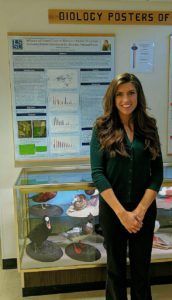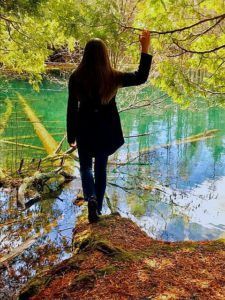MUCC Welcomes New Habitat Volunteer Coordinator
Hello,
My name is Makhayla LaButte, and I am excited to introduce myself as the new Habitat Volunteer Coordinator with Michigan United Conservation Clubs.
Born and raised in Michigan’s Upper Peninsula, I have experienced first-hand the value of Michigan’s natural resources and the challenges we face in conserving them for sustainable, multiple uses. So ingrained is my passion for the natural world that I was inspired to pursue an education and career in the field of conservation. I began building my career in 2013 as a member of Youth Conservation Corps on the Hiawatha National Forest in the Upper Peninsula. It was there that I was first introduced to the scientific research and on-the-ground work required to successfully manage our public lands. Following this eye-opening introduction to conservation were multiple experiences with Michigan’s DNR Wildlife Division and Parks & Recreation Division, as well as additional opportunities to work with the U.S. Forest Service as a Biological Science Intern (Wildlife).
natural resources and the challenges we face in conserving them for sustainable, multiple uses. So ingrained is my passion for the natural world that I was inspired to pursue an education and career in the field of conservation. I began building my career in 2013 as a member of Youth Conservation Corps on the Hiawatha National Forest in the Upper Peninsula. It was there that I was first introduced to the scientific research and on-the-ground work required to successfully manage our public lands. Following this eye-opening introduction to conservation were multiple experiences with Michigan’s DNR Wildlife Division and Parks & Recreation Division, as well as additional opportunities to work with the U.S. Forest Service as a Biological Science Intern (Wildlife).
I’ve banded ducks and Canada Geese, surveyed rare and endangered species like the Kirtland’s Warbler, assembled and maintained Grouse Enhanced Management Sites (GEMS), used aerial telemetry to monitor wolf populations and performed deer and bear checks at DNR Field Offices. Additionally, I have worked tirelessly to foster and improve anthropogenic relationships with the natural world. I’ve been fortunate to experience many different dimensions of the multi-faceted field of conservation and learn from professionals in both state and federal agencies. These experiences have cultivated a deep sense of respect for our natural resources and a drive to conserve and protect Michigan’s outdoor heritage.

I recently graduated summa cum laude from Lake Superior State University with my Bachelor of Science degree in Conservation Biology with a concentration in Human Dimensions. I completed my thesis research on the influence of ground cover type and structure on Kirtland’s Warbler habitat selection in the Hiawatha National Forest. In the future, I aspire to continue my education and pursue a graduate degree in the field of natural resources.
It is exciting to be at the epicenter of our state and have the opportunity to guide MUCC’s award-winning On The Ground program into the future. I believe Michiganders have the good fortune of being heirs to some of the most abundant and high-quality natural resources in the country, and it is more important than ever that we take responsibility for them and promote their continued health and enjoyment. We all rely on these resources in different ways, and I look forward to working with MUCC, its members and its dedicated volunteers to bring our vision of conservation in Michigan to fruition.
The post MUCC Welcomes New Habitat Volunteer Coordinator appeared first on Michigan United Conservation Clubs.
Recent Posts



